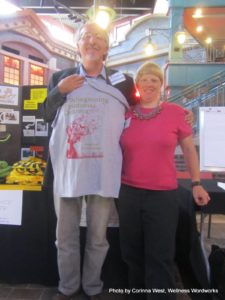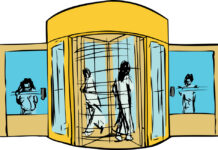Three years ago I was invited at the last minute to a national conference that being held here in KC. I went to the conference because it sounded good. This was despite the fact it was already a busy weekend, in between floating on a hot tub lid down the Missouri River and meeting a dude who was swimming 1000 miles down the Missouri river that year. Which is basically preamble to say, yes, I have a life. Which is more than is expected for a lot of mental health patients. So this is a blog post about an organization we need to wake up. So other people can get their lives back. Plus, just something fun in my life to make me human because sometimes mental health advocates get too single minded.

So, at this national conference, Partnership with Patients, I met a bunch of “e-patient advocates,” which are civil rights fighters in all the other “medical” areas. Most of them haven’t heard of the recovery movement and most of the recovery movement hasn’t heard of them. But basically every single “illness” category has the same problems our community has. Issues with with key opinion leaders, evidence-base, bogus research, and “treatment” vs. prevention. And all areas have advocates who have become, like us, impoverished whistleblowers and crusaders to improve the situation. Those advocates all have lives, too, you know, “sonder,” the realization that everyone has a story.
I know the word “patient” has a lot of baggage in our community because the disease model is one of our biggest barriers to mental health solutions. But in their communities, “patient” doesn’t have quite the baggage, so take it with a grain of salt here.
One thing I learned at that conference was that there are many “patient” advocacy opportunities. One of them is PCORI, the “Patient” Centered Outcomes Research Institute. This is theoretically an organization that funds research that people with lived experience ask for. However, the problem is that they aren’t really talking to our community and we aren’t talking to them. So they did this big splashy launch about “mental health as a major focus,” and they said what they had figured out that mental health needed was. No joke, they said,
“Among the high-priority topics are autism, suicide, and integration of mental and behavioral health services into primary care for both the general population and for people at risk for disparities in health care and outcomes.”
So here’s how to connect with them to tell them what we actually DO need. This might be an advocacy target worth our while because sharing our stories, your story, is one of our most powerful advocacy tools. Plus they have a ton of money to hand out, over $800 million so far, and they are theoretically paying attention to what advocates say.
- Put some comments below on my post here about what research you think the mental health community needs

- Review their PCORI funded projects and paste below a summary of the good ones and bad ones so our community can do some advocacy to their selection committees. They say they have 38 “behavioral” health projects funded so far. I know one is Larry Davidson from Yale who does peer support stuff, and one is on Common Ground, Pat Deegan’s medication optimization and empowerment setup in waiting rooms. Those two at least are good, but I’m not sure about the others. Help me with a bit of legwork.
- Submit a “patient” centered research question to PCORI.
- Follow PCORI on Twitter and respond to their stuff, join their TweetChats. They did a TweetChat a couple of months ago and invited a bunch of disease model advocacy groups but forgot to invite the recovery movement. I’m sorta not sure they know we exist, so let’s get a bit louder on their radar.
- Join one of their advisory panels.
- Go to one of their conferences on how to get research funding.
- Any other ideas? This might be a lost cause but I think this might be a place where some well applied recovery movement pressure can get some stuff moving. So that all people with mental health labels can get back to just having a life

And tell me about your life, too. I’m still doing brain injury recovery stuff and sometimes I miss seeing people out and about. I miss these type of conferences I used to attend. I miess interacting online about some of my ideas in progress. Hi, it’s good to post again. Sooner or later I’ll be back after it, with a nice long story of brain injury recovery. And maybe the business revolution to knock some socks off the providers. #TBIsux #DiseaseModelSux #ExpectRecovery #PCORIneedsRealTalk















Corinna,
Idea for what I believe is important research for humanity . Is a study comparing young healthy families (trying to find child abuse free families ) with similar incomes living half of them vaccination free also conventional ADA dentistry free one group under the care of Traditional Naturopaths and Homeopaths and Traditional Chinese Medicine , also getting DAMS ( Dental Amalgam Mercury Solutions ) recommended dental care. The other group of families getting conventional AMA recommended “care” and conventional dental care. Preferably 200 families in each group and living under similar governments and air ,water, food ,quality, ,availability. Following the families for a decade to see how many members of each group are captured by the psych-pharmapeligo complex.
One reservation, actually I believe the conventional group is bound to be mistreated by conventional medical people and dentists and the psychiatrists and it would be unethical to make them stay under this type of pseudo scientific care .
I’ve gone kayaking before and know that going down the river on a hot tub lid with friends must have been great fun . You’re an inspiration .
Fred
Report comment
“But basically every single “illness” category has the same problems our community has. Issues with with key opinion leaders, evidence-base, bogus research, and “treatment” vs. prevention. ”
Sadly that is true. Even sadder: these are not new issues. I recommend reading a book by Bernard Shaw “Doctor’s Dilemma” (especially the author’s preface) written some 100years ago and seeing what’s changed. Spoiler alert: not much.
Report comment
Damn, Corinna! Took me 11 months to find this post! I’m trying to mentally digest everything you’re saying here. What makes that easy, is my own 40+-year “lived experience”, and being “shrink-proof” the past 20 years….. Seriously, when you write, I grok. I understand what you’re saying intuitively, and I’m in 99% agreement. I won’t even begin to argue that 1%. You know there’s a big discussion this week, on MIA. Sera D. wrote a doozy of a piece about “MHFA”, and that’s some scary stuff. I *think* the Director of the local CMHC is doing a program on “MHFA”, but I need to confirm that. I wish I had some support here, but I have to do what I have to do. I have to keep working for justice for oppressed so-called “mental patients”. I’m tired of seeing the so-called”mentally ill” used as pawns, scape-goats bargaining chips, and CASH COWS for society. It’s happening now with the bogus “opioid/heroin/fentanyl crisis”. (There really *IS* a huge surge in narcotic drug use – I’m talking about how the “system” is using it politically and financially. They’re more interested in expanding “Drug Courts”, and employing “drug treatment workers”, than they are in actually helping people.)
Please keep doing what you’re doing. I’ve learned that you do VERY GOOD WORK here on MIA.
Thank-you.
BTW – When I started reading on military health-related sites about mTBI, and PTSD, I realized how my own head injury trauma, and the trauma of forced drugging & incarceration in “mental illness” hurt me so much….And how alike they & I are…. My severe head injury trauma was NOT factored in to my “mental illness” stuff decades ago….The psych drugs did far more harm than good…. Sound familiar?
Also BTW – Do you know anything about “mindfreedom.org”? I’m thinking of doing something with them. We need more group-work, I think.
Report comment